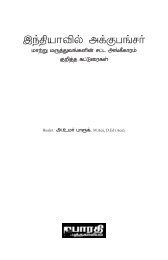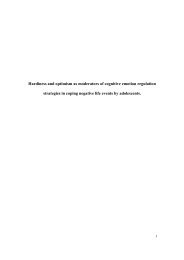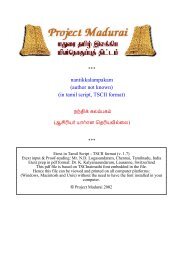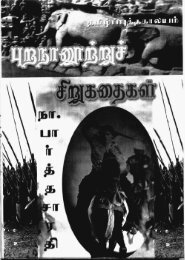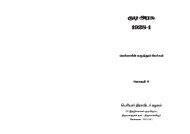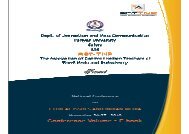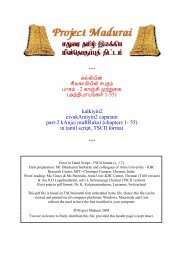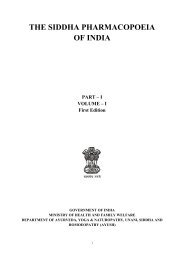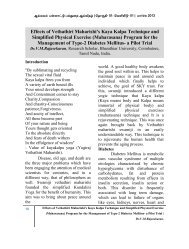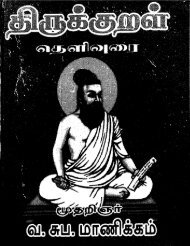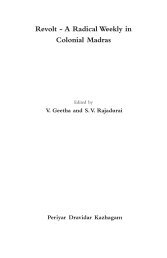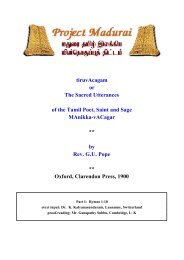THE FUNDAMENTAL RULES OF THE TAMIL NADU GOVERNMENT
THE FUNDAMENTAL RULES OF THE TAMIL NADU GOVERNMENT
THE FUNDAMENTAL RULES OF THE TAMIL NADU GOVERNMENT
- No tags were found...
Create successful ePaper yourself
Turn your PDF publications into a flip-book with our unique Google optimized e-Paper software.
If no order is passed directing that the period of absence be treated as duty for any specifiedpurpose, the period of absence should be treated as “non-duty”. In such an event, the past service(i.e.) service rendered before dismissal, removal, compulsory retirement or suspension will not beforfeited.(ii) As rule 54 is absolute, the law of limitation need not be invoked at the time of paying the arrearsof pay and allowances for the period from the date of dismissal/removal/compulsoryretirement/suspension to the date of reinstatement in respect of all cases where the pay andallowances are regulated on reinstatement in accordance with the provisions contained in rules 54,54-A and 54-B, with the exception of those covered under sub-rule (4) of rule 54 and sub-rule (2) (i) ofrule 54-A.(6) Fundamental Rule 54 is in applicable in cases where dismissal/removal/discharge from ortermination of service is held by a Court of Law or by an appellate/reviewing authority to have beenmade without following the procedure required under Article 311 of the Constitution. In such cases—(i) if it is decided to hold a further inquiry and thus deem the Government servant to have beenplaced under suspension from the date of dismissal/removal/discharge/termination, under rules 17(e)(3) or 17 (e) (4) of Tamil Nadu Civil Services (Discipline and Appeal) Rules or a corresponding rule,the Government servant will be paid the subsistence allowance from the date he is deemed to havebeen placed under suspension.(ii) if the Government servant is not “deemed” to have been under suspension as envisagedunder (i) above, the payment of full pay and allowances for the intervening period and treatment ofthat period as duty for all purposes will be automatic and compulsory, provided that—(a) the arrears should be paid subject to the law of limitation; and(b) where the reinstated Government servant has secured employment during any periodbetween the dismissal/removal/discharge/termination and reinstatement, the pay and allowancesadmissible to him after reinstatement for the intervening period shall be reduced by the emolumentsearned by him during such employment, unless the emoluments earned by him exceed the pay andallowances admissible to him. If the pay and allowances admissible to him after reinstatement for theintervening period are equal to or less than the emoluments earned by him during such employment,nothing shall be paid to him:Provided that the amount to be paid under (i) and (ii) above will be determined subject to thediscretions, if any, in the decree of the court regarding arrears of salary.[with effect from 27th April 1963.](Memo. No.136549, F.R. 61-23, dated 2nd November 1963.)(7) Uniform allowance shall not be granted during the period of suspension even if the period issubsequently treated as duty or leave as the case may be.(Memo. No. 15813, F.R. 65-5, dated 7th September 1965.)(8) A Government servant, who has been placed under suspension pending enquiry, should not bedismissed or removed or compulsorily retired from service retrospectively from the date on which hewas placed under suspension. The order in such a case should take effect only from the date of issuethereof.[G.O. Ms. No. 278, Finance (F.R.), dated 24th February 1972.]9. Where a Government servant is,—(a) Placed under suspension in view of the fact that a complaint against him of any criminaloffence is under investigation or trial; or(b) dismissed or removed from service or compulsorily retired on the ground of conduct whichhas led to his conviction on a criminal charge andthe Government servant is subsequently reinstated in service on his acquittal by the Courteither on merits or on the ground that the charge has not been proved against him or by giving benefitof doubt or on any other technical ground, *or on the ground that he has been pardoned by the Courtas he turned approver based on his judicial confession, he must be regarded as having beenprevented from discharging his duties and the period of his absence including the period of103



